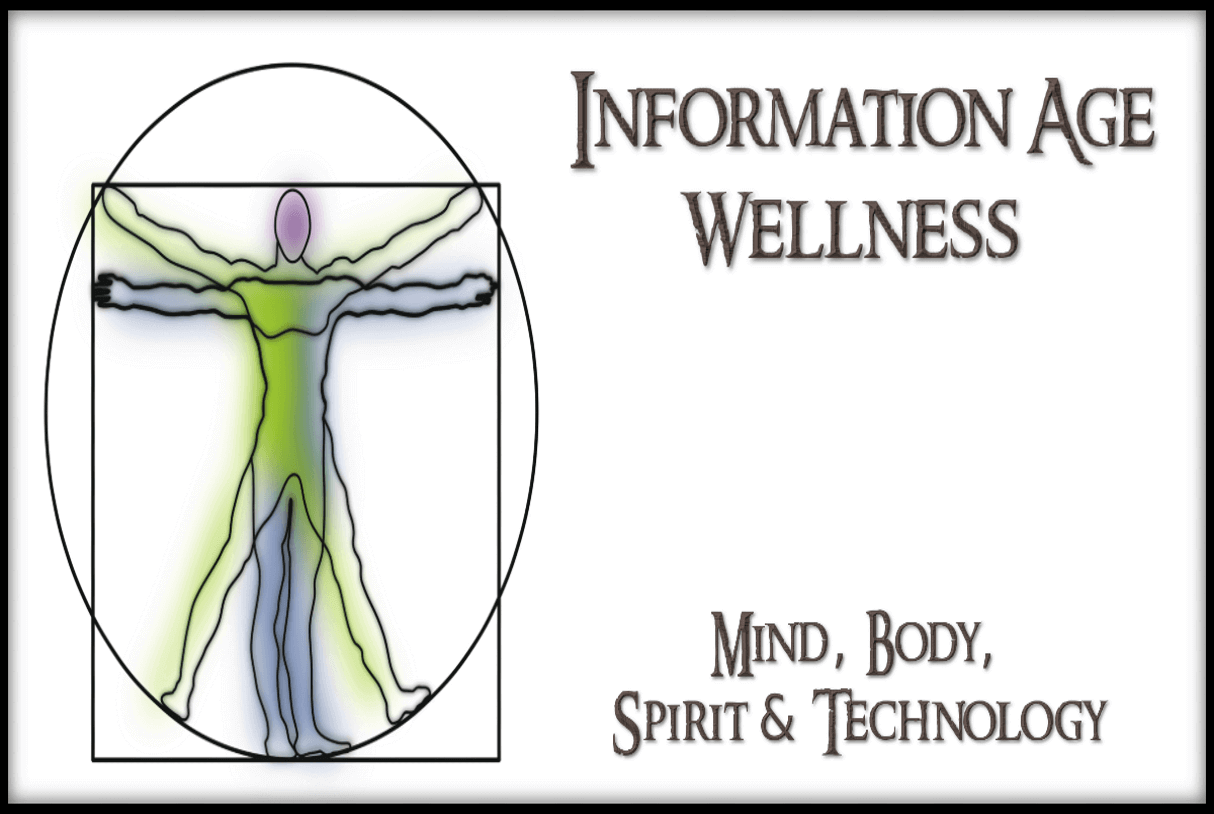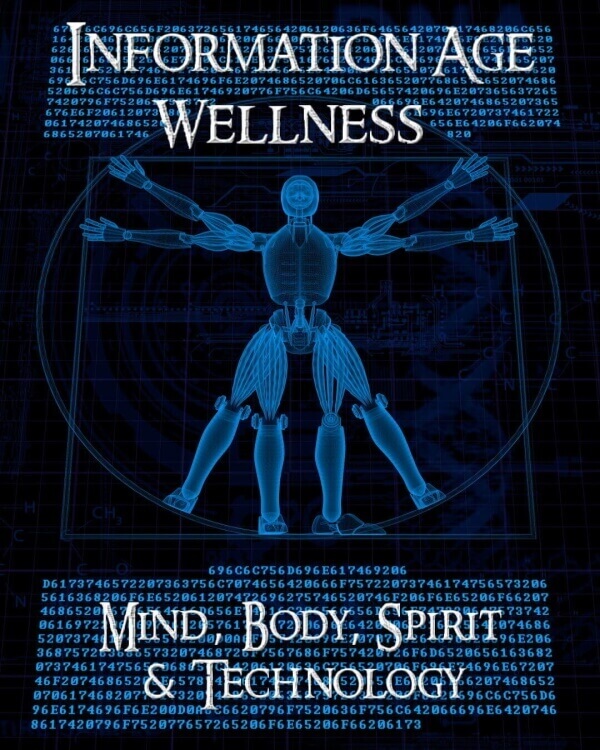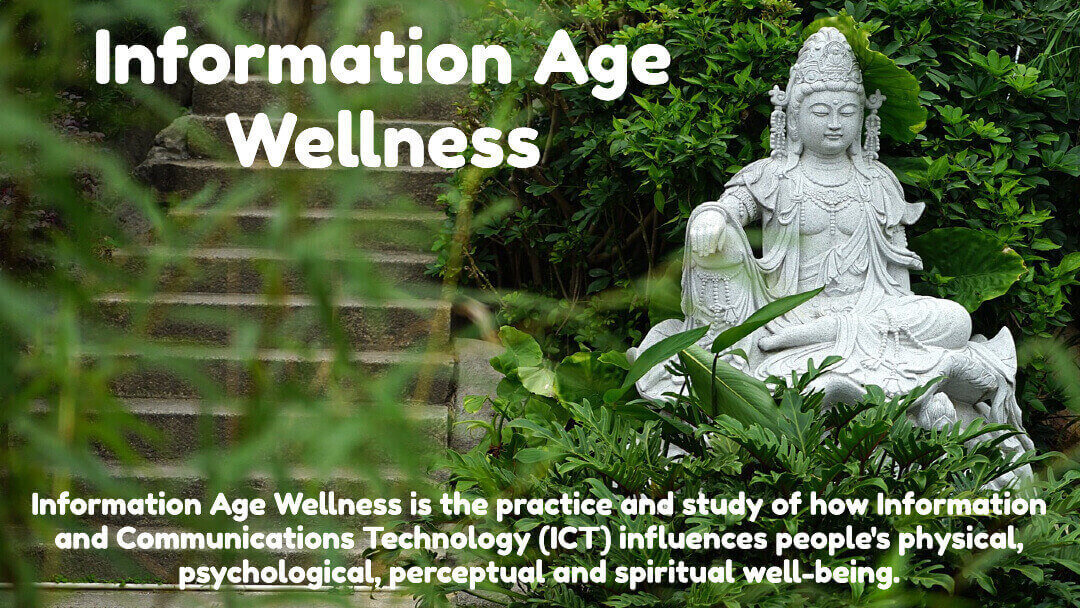
Information Age Wellness (IAW)
Mind, Body, Spirit & Technology
(Published 2013)
Information Age Wellness (IAW) explores how information technology influences people’s physical, psychological, perceptual and spiritual well-being in relationship to self-preservation and humility. By incorporating safe and productive online practices, citizens reduce sensing perceptual disconnectedness by focusing on mind, body & spiritual endeavors fostering social engagement. Information Age Wellness views the mind, body, spirit and technology as a new homeostatic system capable of optimization.
This writer’s concept of IAW is not just a tweak in terminology about the Mind/Body Approach, Holistic, Integrative and Complementary Medicine. It is humanity’s inevitable future if it is to survive and thrive. Given the internet is less than half a century old, the true definition, understanding and applications of IAW is merely an idea, yet to be formalized. It cannot be emphasized enough by stating that present day humanity is at the beginning of a larger macroscopic change in thinking in which Cybernetics, Infocomm, Telemedicine and Internet Safety will be vital to life for future generations.
Without sounding fatalistic, one does not have to have an advanced degree in sociology, psychology or anthropology to notice that society has begun to show what this writer calls “perceptual disconnectedness” among its citizens due in part to the rapid growth of information technology. With the growth of mobile device technology, people are spending more time online and less time engaged in real world interpersonal relations. Homo Sapiens, humans, are social pack creatures genetically and psychologically wired to be asocial and community oriented. Whether you subscribe to a religious dogma, are agnostic or atheist, few can disagree that humans are social creatures with community as central to all life functioning.
For some reason, and this writer hopes IAW begins to address this societal trajectory, is the fact that a growing number of children, adults, groups and communities are becoming isolated, detached, disengaged and disconnected. It is as if information technology has somehow created a “detachment wedge” between humans. Not that this writer is calling for an internet shut down or return to pre-Information Age society, quite the opposite, but awareness and wellness; IAW.
Also, since the beginning of human civilization and so will be ad infinitum, are those who are opportunists, parasites, criminals, deviants and depraved. As this writer has stated before, humans are the only living organisms on the face of the planet capable of brutalizing one another for reasons other than survival, procreation and self-preservation. Historians, philosophers and religions have attempted to define why this happens, but now, the Dark Psychology of the human mind has yet to be explained. The elegance and wonder cyberspace have given humanity is awe-inspiring. The downside is the Dark Side of Cyberspace.
Dark Side of Cyberspace is a term this writer uses to describe how, why and where criminals, deviants, depraved and the deceptive call their home. Within all human minds and within the artificial and abstract dimension of cyberspace, lies an area in which narcissism, depravity and malevolence reigns. As written above, “Whether you subscribe to a religious dogma, are agnostic or atheist, few can disagree that humans are social creatures with community as central to all life functioning.” If you subscribe to this statement, you also must agree that charity, humility and selflessness are also part of the human psyche. Within the Dark Side of Cyberspace, charity, humility and selflessness are absent concepts.

Dark Side of Cyberspace & Rise of iPredator
For this reason, this writer developed the conceptual framework of iPredator, to help address the segment of humanity who embarks upon the journey to the Dark Side of Cyberspace. Information Age Education, Information Age Wellness and Information Age Forensics are concepts this writer hopes will one day trigger the “protect the flock” genetic wiring that resides within all socially centric sentient beings. The concept of Information Age Wellness attempts to encourage a community discussion on how mind, body and spirit interact with technology. To explain this writer’s observations and concerns, two recent firsthand experiences are as follows:
I. About a year ago, I went to visit my family physician for a scheduled checkup and his offices are across the street from one of the larger high schools in my home county. After leaving his office, it was also the same time that students were released from their day of classes and I came to a traffic light. As I was sitting there, waiting for the red light to turn green, I noticed a large group of students standing together and was quite intrigued by what I observed. Of the 23 students huddled together in their clique, and I counted twice, 17 of them were engaged with their cell phones and smartphones.
As plain as day, 17 of the 23 children had their small black and silver devices no more than 2-3 inches from touching their nose. 17 out of the 23 students were more engaged with their mobile devices than chatting about talking about teen issues related to girls, boys and the upcoming prom or home-coming game.
Using my handy-dandy online percentage calculator, 17 out of 23 rounded off equals 58.9%. In my earlier life, as a practicing psychologist specializing in working with children, teens, their families and forensics, I am very adept at understanding Developmental Psychology, puberty and pediatric maturation stages. Having previous academic and professional clinical experiences to judge what I was seeing before me; I could not understand why 17 out of 23 kids were more absorbed with their digital devices than how their friends and foes were acting in relationship to their own developmental needs to be accepted and recognized.
It truly was the total opposite of what I had learned, evaluated and experienced about adolescence. All I could conclude was that the Information Age, social networking sites, and the internet had become more important to their adolescent stage of individuation than their peer relationships standing inches away.
II. From 2012 to early 2013, I conducted my own mini-experiment and survey to assess if the professional world, from which I work in, was aware of the Information Age we now live in. I wanted to see how information technology, the internet and social media was being addressed by my peers working in behavioral and medical healthcare, academics, law enforcement and the judicial system.
When a patient visits a doctor or a client meets with an attorney, he or she is first asked a series of questions by the professional for purposes of data collection. In the world of behavioral healthcare from where I was trained in, it is called the Biopsychosocial Assessment. During my 1.5 year mini-experiment, I asked every professional the following question,
“When a patient or client comes to your office and you ask questions to collect data about how to assist them, what areas do you explore in regard to their cyber life?” To clarify the question, I then stated their cyber life meaning their time spent online, their understanding of internet safety and if they, their loved ones or associates had been affected, harmed or concerned about cyberbullying, cybercrime, cyberstalking and the myriad of other dark side elements growing rapidly within America. Mind you, I did not tell them of my mini experiment nor verbally set them up to respond as I had hoped.
The results of my non-validated cognitive clinical mini experiment. Of the 46 M.D.’s, Ph.D.’s, Psy.D.’s, C.S.W.’s and J.D.’s and college educated professionals. How many of the 46 do you think answered with a response confirming they collected data and asked questions about the client’s or patient’s cyber life? Of the 46 advanced degree professionals, zero of them included a line of questions addressing Information Age Wellness issues.

God Bless Octogenarian, Dr. Michael Kulla
I ended my mini experiment speaking with my Octogenarian mentor, Dr. Michael Kulla, and he was also quite intrigued knowing how information technology has changed the fabric of society behaves in the 21st century. Although he and I are on opposite ends of the political and philosophical spectrum, I trust him implicitly and view his insights as golden.
After thinking about this writer’s conclusions and how the professional world is also in the proverbial dark, Dr. Kulla became #47 allowing me to close my mini experiment. Although retired from the world of F/T private practice, he still works with a small pool of clients on a case-by-case basis. As #47, he is the first professional I know that makes it a habit to ask a new client about their cyber life. God Bless Dr. Kulla!
Information Age Wellness
Information Age Wellness: Information Age Wellness is the practice and study of how Information and Communications Technology (ICT) influences people’s physical, psychological, perceptual and spiritual well-being. By incorporating safe and productive knowledge and practices, citizens of the Information Age are both safer from cyber-attacks and able to focus on mind, body & spiritual optimization endeavors.
IAW incorporates mind, body, spirit and information technology for those seeking a healthy lifestyle. Information Age Wellness is a combination of Internet Safety, Spirituality, Integrative Medicine & Health Psychology while recognizing the growth and dependency of information technology upon people.
Information Age Health & Wellness should not be confused with online healthcare, telemedicine, e-health or any other medically themed field that interfaces with Information and Communications Technology. Not that these arenas are not relevant, because they are vital to the medical health and longevity of all citizens thriving in the Information Age. Information Age Wellness is more of a conceptual framework, which includes physical health, but also includes psychological and spiritual health and well-being in relationship to technology.
IAW is the practice and study of how Information and Communications Technology (ICT) influences physical, psychological, perceptual and spiritual well-being. By incorporating safe and productive knowledge and practices, citizens of the Information Age are safe from cyber-attacks and able to focus on mind, body & spiritual optimization endeavors. Information Age Wellness incorporates mind, body, spirit and ICT for those seeking a healthy lifestyle.

Michael Nuccitelli, Psy.D.
Michael Nuccitelli, Psy.D. is a NYS licensed psychologist, cyberpsychology researcher and online safety educator. In 2009, Dr. Nuccitelli finalized his dark side of cyberspace concept called iPredator. Since 2010, he has advised those seeking information about cyberbullying, cyberstalking, cybercriminal minds, internet addiction and his Dark Psychology concept. By day Dr. Nuccitelli is a practicing psychologist, clinical supervisor and owner of MN Psychological Services, PLLC. After work and on the weekends, he volunteers helping online users who have been cyber-attacked. Dr. Nuccitelli’s is always available to interested parties and the media at no cost. This website and everything created by Dr. Nuccitelli is educational, free and public domain.![]()